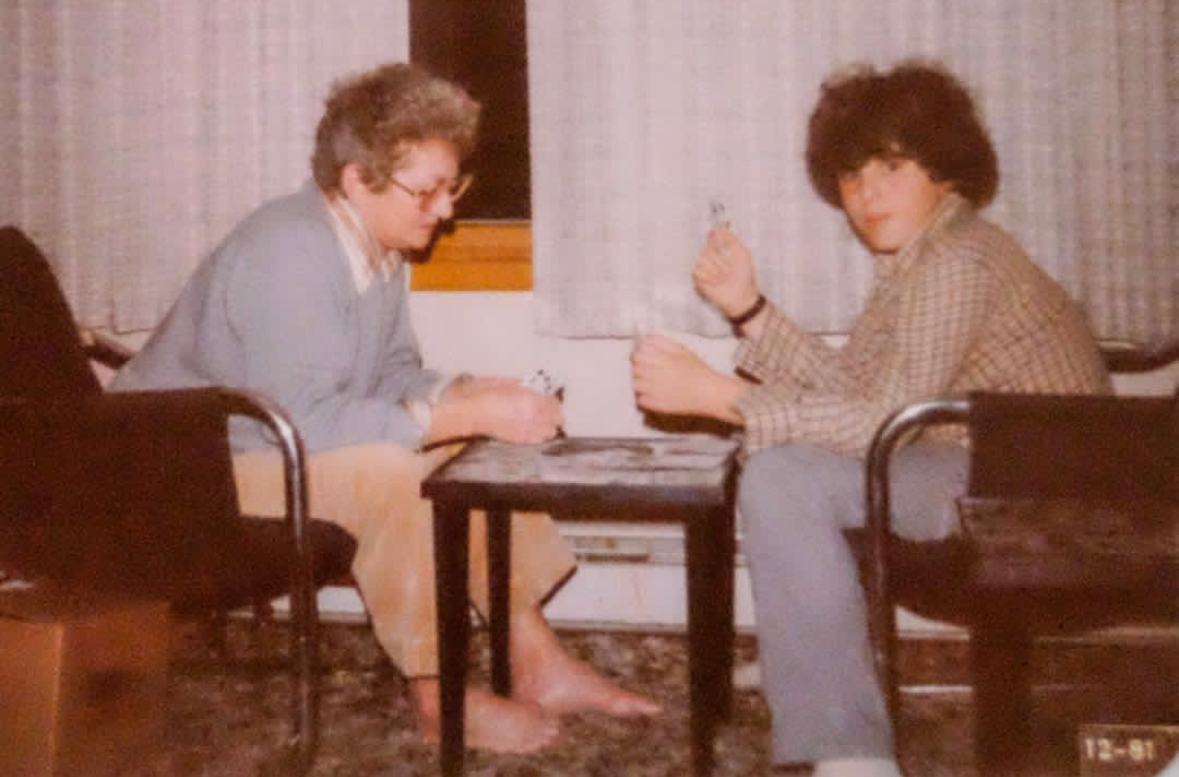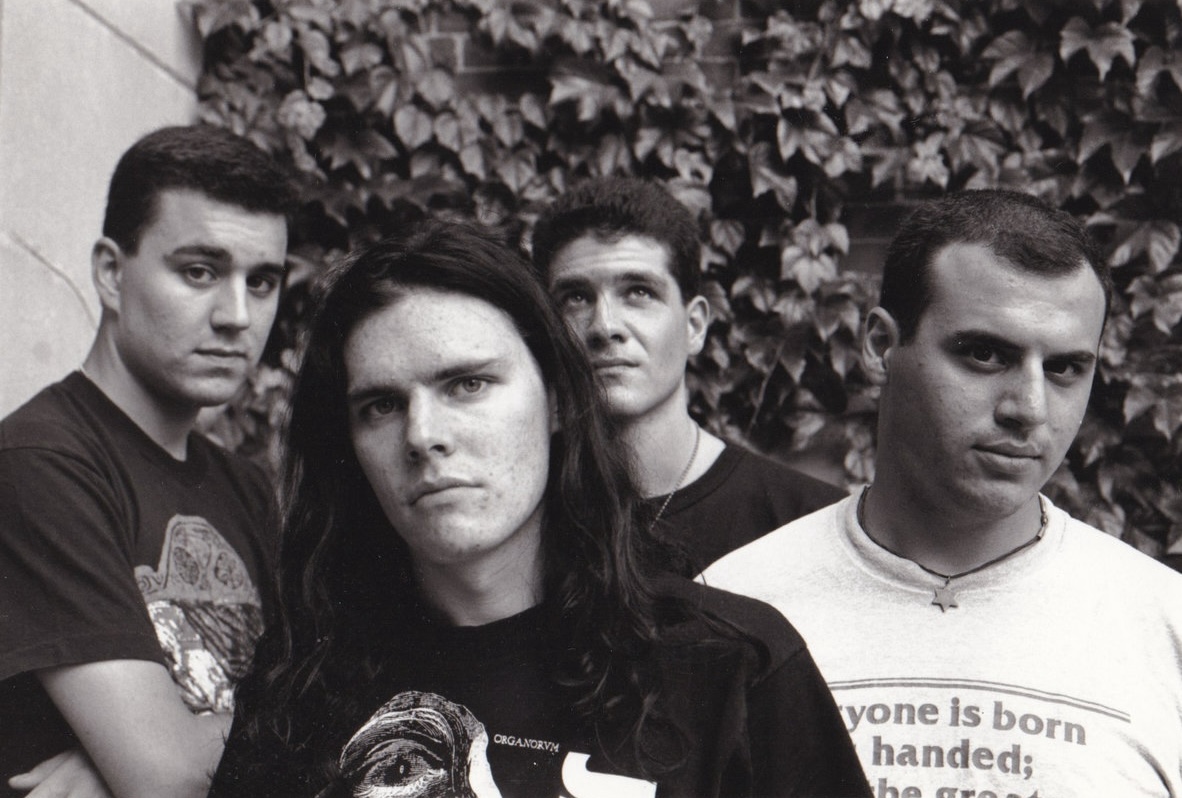If you’re in New York City, I hope to see you at the Poetry Project for Tara Aisha Wills and Damon Locks’ Step Step Step duet.
My Life with Peter Gabriel, Part Five
I joined Jawbox in 1992. It wasn’t my first band but it was my first mature band, the first group that was already on its way, touring, making records. It was not only a new practical level for me but a new social one as well. The band was known and popular. It was a breakout situation for me and I was anxious. My first couple of months with the group were spent learning the songs. Our singer and leader, J. Robbins was touring with his friends in Pegboy and we used the time at home to get me settled in with Kim (Coletta, bass) and Bill (Barbot, guitar and vocals).
I knew the songs as a fan so rehearsing them was more a matter of getting a handle on the arrangements than finding my place in them, a goal we postponed until J. got home. By that time, nine weeks later, I was ready to run through the set. Looking back, I established myself quickly, and if memory serves my first show in the band was in July of that year and we left for tour immediately after that.

We wrote, in those short months, two songs as a group, a new and exciting turn for the band. Previously, J. more or less wrote the material and presented it to the band fully formed and arranged. One of the new songs, “Jackpot Plus!” was, in some ways, as much of a straight-up post-hardcore song as we ever played. Like many young players, I was creating my parts to suit the genre as opposed to molding the genre to suit my playing. Two relevant drummers in particular, Peter Moffett from Government Issue and John McEntire from Bastro were on my mind, and though I no doubt failed to rise to their level, I think my beats are a short step away from “Jaded Eyes” and “Recidivist.” What I wanted was to sound like them.
The other song we wrote was called “Motorist.” It was a new kind of song for the band, a new feel. It marked my first effort to rip off Manu Katché, Peter Gabriel’s drummer from So onward. It was, like many such efforts, a failure. I was hoping for something along the lines of “Digging in the Dirt,” which was released the month before on Peter Gabriel’s Us the eagerly anticipated follow-up to So.
There was a lesson in this failure: not sounding like Katché led directly to a reliance on my own voice and feel on the drums. And I noticed it. Whether or not I sounded like anyone else became immaterial and even something to be avoided. That is, I think “Motorist” was the first time I sounded like myself. From that point on, I brought influences I knew I could not reproduce, just to see what would happen in the group.
We re-recorded the song “Jackpot Plus!” for For Your Own Special Sweetheartas well, and the sort of refinements we were looking for individually and as a group are audible. The production is more focused, more in tune with the kind of energy we sought in our live performances. And the feel of it is shared, common among us. By the time we recorded FYOSS we were functioning much more as a single unit, feeling our performances together instead of playing by rote.
I found that almost anytime I introduced one of Peter Gabriel’s or Manu Katché’s rhythmic strains into the band, it warped or escalated or shifted into a new and original feel. To reiterate at the risk of redundancy, the distinction between influence as a site of imitation and influence as a site of creation changed everything. I don’t think I quite knew this before. And as our music became increasingly reliant on the drumming, these strains came to guide much more of what we were writing. As was true for the band as a whole, this was the moment I transitioned from being a musician who sought to make sounds like those I loved (imitation) to one who sought to make sounds that originated in my own playing (creation). Like PG says in “Sledgehammer,” paraphrased: I shed my skin. This was the new stuff.
Today Is My Grandmother’s Birthday
Today is my maternal grandmother’s birthday, and although she died in 1996, I keep the date on my calendar.
She and my grandfather, known as Gram and Grandad, lived outside of Buffalo, about an hour away, and throughout my early life and adolescence I seemed to be there regularly, often enough that it was always a joy and never a surprise to see her.
As a teen I smoked cigarettes in her house, in the living room with her and Grandad if it was just the three of us, or downstairs from the kitchen if there were other adults around. It was a matter of decorum, a way of accepting me for who I was (a delinquent who smoked cigarettes) while acknowledging that it wasn’t altogether acceptable.

She was a complicated person, I think, in and of a time when women were supposed to be simpler, and deserves greater consideration than this post can provide. I’ll no doubt write about her more in the future but for today, I’ll just say as I always do on this day, happy birthday, Gram! I love you!
New Newsletter
New newsletter just went out! If you don’t subscribe, you can catch up here.
The Gentlemen
We made our way through The Gentlemen which was fine and enjoyable but didn’t have much of a tail like that of a truly great show (e.g. Perry Mason, Fargo, Atlanta). I know it’s not fair to compare a routine series to a great one but that’s what came to mind when we wrapped it up.
Clarion Beauty
PHOTOGRAPHING BLACK SELF-CREATION IN THE AMERICAN SOUTH | The Atlantic
How Rahim Fortune depicts the beauty of a place and its people
Watch the Closing Doors

My Life with Peter Gabriel, Part Four
I began playing a drum set when I was 10 and showed promise and aptitude for the instrument from the start. It didn’t take long for music to become a significant part of both my identity and my worldview. During an especially unhappy period of time in Fairfax, VA when I was 12-13, drumming and music came to be my only source of social capital or interaction. I was fortunate to find, or be found in shop class by, a similarly disenchanted boy, one of extraordinary musical skill named Kevin who needed a drummer. What 12 year-old approaches another and says he “needs a drummer?” Prior to this he had only spoken to me twice, the first time he said “Cool bandana,” which was of course not true though I believe he thought it was. The second time, looking over my shoulder as I pored over the pages of the fall 1981 Pearl Drums catalog, he pointed at a black five-piece kit and said, “I have that one.” So he needed a drummer. He had my dream drum set and no one to play it while he played keyboards or guitar. I have counted Kevin McKendree among my dearest friends since that time. His talent persists, too: he is among the most intuitive and supportive musicians I have ever known. A true inspiration.

I bring all of this up because it taught me that playing music could be the entirety of a life, or close to it, its whole flow, in and out, as Peter Gabriel has come to say, delivering me from all manner of pain and confusion and loneliness to a world of people working together to make themselves and others feel good or better. And not only did I encounter this sensibility as a player, I came to internalize it as a listener. And a year later, I saw the “Games Without Frontiers” video for the first time. Three years after that, still imbued with this sense of music I could neither quite grasp nor articulate, I heard So for the first time, a record that would change me forever, become a baseline of what music, any music, can aspire to in its ability to self-generate its moment and environment, its own container, its own prophecy and destiny. It was very heavy stuff for my young mind.
I didn’t know this at the time, but it was a sort of big bang in my consciousness. Or if I intuited it, it wasn’t something I could deal with yet. The missing ingredient, as it happened, came in 1988 when I joined or fell into the punk scene.
It turns out that many young punks in the mid- and late-1980’s met because they had gone to rehab. I won’t go into it any further than that, but I was no exception to this trend, even if I seemed to get there (to punk, not to rehab) a few years later than my friends. This was fine, though, as they were there to shepherd me along. I came to understood punk to be much more of a mindset than a style, and it was through this mindset that I recognized the full achievement of So. The link was that one’s commitment to one’s art or even one’s self at all, could be unfettered by what one used to do or be. One could decide to change and, with varying degrees of difficulty, do so. If I wanted to be punk, I’d have to decide what that meant or looked like.

If I wanted to play punk music, the same principle would apply. There was room in the scene to drum in a way that included whatever I brought to the group. It was much more open than I understood other music to be and this sensibility gave rise to the drumming I would develop a few years later when, after a brief hiatus from playing altogether, I joined Jawbox. All of which brings us to my playing on the record for which I am usually best known, For Your Own Special Sweetheart.
It’s Totally Insane
NYC will allow companies to test autonomous vehicles on its streets | Gothamist
“It’s totally insane. Pedestrians cross streets in Manhattan, like no other city in the country,” said John Samuelsen, the international president of the Transport Workers Union. “They do whatever they want, whenever they want. These vehicles are not prepared to deal with that type of pedestrian interaction.” It’s totally insane. Pedestrians cross streets in Manhattan, like no other city in the country,” said John Samuelsen, the international president of the Transport Workers Union. “They do whatever they want, whenever they want. These vehicles are not prepared to deal with that type of pedestrian interaction.”
The Birthplace of a Movement
Nuyorican Poets Cafe, an East Village icon, begins a $24M makeover | Gothamist
The Nuyorican Poets Cafe closed in November in preparation for the makeover. De La Luz said she was pleasantly surprised to discover at a groundbreaking on Thursday that the timeline for the entire renovation had been accelerated from three years to two, putting the completion date in spring 2026.